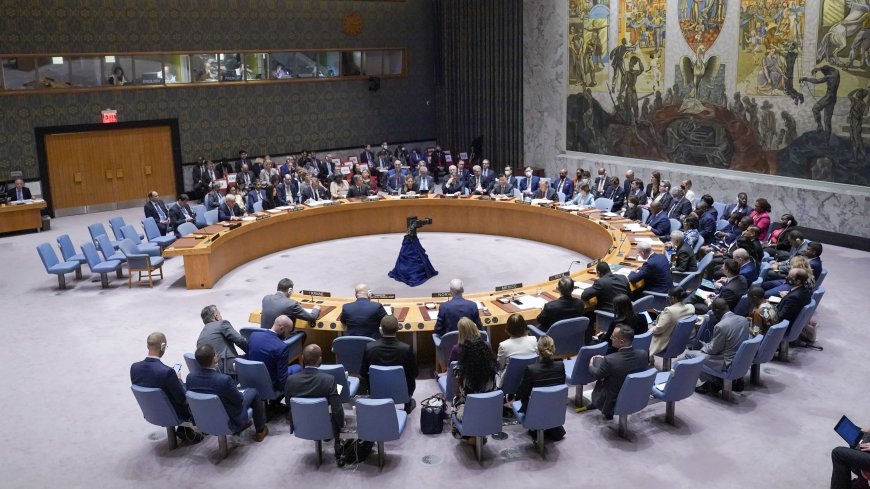India to Approach UNSC Over Cross-Border Terror: A Strategic Diplomatic Offensive
India plans to move the UN Security Council against three Pakistan-based terrorists involved in attacks on Indian soil. Here's what this diplomatic step means for global counter-terrorism and Indo-Pak relations.

India Plans to Move UNSC Against Three Terrorists: A Bold Bid for Global Accountability
India is preparing to submit fresh proposals to the United Nations Security Council (UNSC) to designate three Pakistan-based terrorists involved in attacks on Indian soil under the UN 1267 Sanctions Committee. The move comes at a time when the international community is increasingly focusing on combating cross-border terrorism, especially in South Asia.
The proposed listings are expected to target key figures associated with banned outfits operating out of Pakistan, particularly those with documented roles in orchestrating or financing terror attacks in India. This development reflects India’s sharpened diplomatic posture and sustained efforts to hold terror sponsors accountable on a global platform.
According to The Economic Times, Indian authorities have prepared dossiers backed by intelligence inputs, satellite imagery, and financial tracking reports to support the listings.
Who Are the Terrorists India Is Targeting?
While the names have not been officially disclosed, sources close to the Ministry of External Affairs (MEA) indicate that the individuals are affiliated with globally recognized terrorist groups such as:
-
Lashkar-e-Taiba (LeT)
-
Jaish-e-Mohammed (JeM)
-
The Resistance Front (TRF), an LeT proxy operating in Jammu and Kashmir
These individuals are reportedly linked to past high-profile terror incidents, including the Pulwama suicide bombing in 2019, targeted attacks on security personnel in Kashmir, and coordinated infiltration attempts across the Line of Control (LoC).
India’s case is expected to emphasize their operational roles, funding channels, and safe haven status in Pakistan, urging the UNSC to freeze their assets, impose travel bans, and initiate arms embargos.
India's Strategy: Leveraging Global Norms and Precedents
India’s upcoming proposals follow recent successful global efforts to designate terrorist financiers and leaders. New Delhi is expected to invoke past UNSC precedents and counter-terrorism frameworks such as:
-
UNSC Resolution 1267, which allows the designation of individuals associated with Al-Qaeda, ISIL, and affiliated entities
-
Financial Action Task Force (FATF) grey list provisions related to terror financing
-
International obligations under UNSC Resolution 1373, which calls for member states to combat threats to international peace through collective action
This marks a continuation of India’s strategy of internationalizing cross-border terrorism, particularly in light of Pakistan’s recurring role in providing safe havens to wanted militants.
For background on UNSC's counter-terror listing mechanisms, refer to UN Counter-Terrorism Executive Directorate (CTED).
Previous Attempts and the China Veto Problem
This isn’t India’s first attempt to get terrorists designated at the UNSC. In the past, India—along with support from the United States, France, and the UK—has faced repeated technical holds from China, a permanent UNSC member and close ally of Pakistan.
One prominent example is China’s initial opposition to the designation of Masood Azhar, the chief of JeM, in 2019—a move that only succeeded after years of sustained lobbying.
Analysts believe that India is better prepared this time, having strengthened its case with financial trail data, verified attack logistics, and international cooperation from intelligence-sharing allies.
According to ORF's strategic brief, India is also expected to engage in quiet diplomacy with China to avoid another blockade.
A Message to Pakistan and the Global Community
India’s move is more than a legal mechanism—it is a diplomatic offensive aimed at:
-
Exposing Pakistan’s duplicity on counter-terrorism
-
Building international pressure on nations harboring terrorists
-
Creating a deterrence framework through public exposure and sanctions
If successful, this action would set a precedent for other states suffering from externally backed terrorism. It could also further isolate Pakistan diplomatically at forums such as the FATF, where it has narrowly avoided being placed on the blacklist in recent years.
For ongoing monitoring of Pakistan’s compliance with FATF obligations, check FATF’s official evaluation reports.
What’s Next?
India is likely to submit the proposal within the next few weeks. The UN Sanctions Committee will then assess the documentation and consult all 15 UNSC members before taking a call. A single permanent member’s objection (particularly China’s) could stall the process, but India is preparing parallel lobbying efforts in New York, Geneva, and major capitals.
The coming days will also see:
-
High-level diplomatic outreach by India’s Permanent Mission to the UN
-
Cross-agency coordination between MEA, NIA, and RAW for real-time inputs
-
Public engagement through statements by India's External Affairs Minister and National Security Advisor
Conclusion: A High-Stakes Diplomatic Gambit
India’s decision to approach the UNSC against three Pakistan-based terrorists is both timely and strategically calculated. In an era where diplomacy is increasingly blended with intelligence, lawfare, and digital activism, this move underscores India's commitment to a rules-based global order.
Whether the effort succeeds in achieving formal designations or not, it reasserts India's stance against state-sponsored terrorism and reaffirms its role as a responsible global actor seeking justice through international institutions.



















































